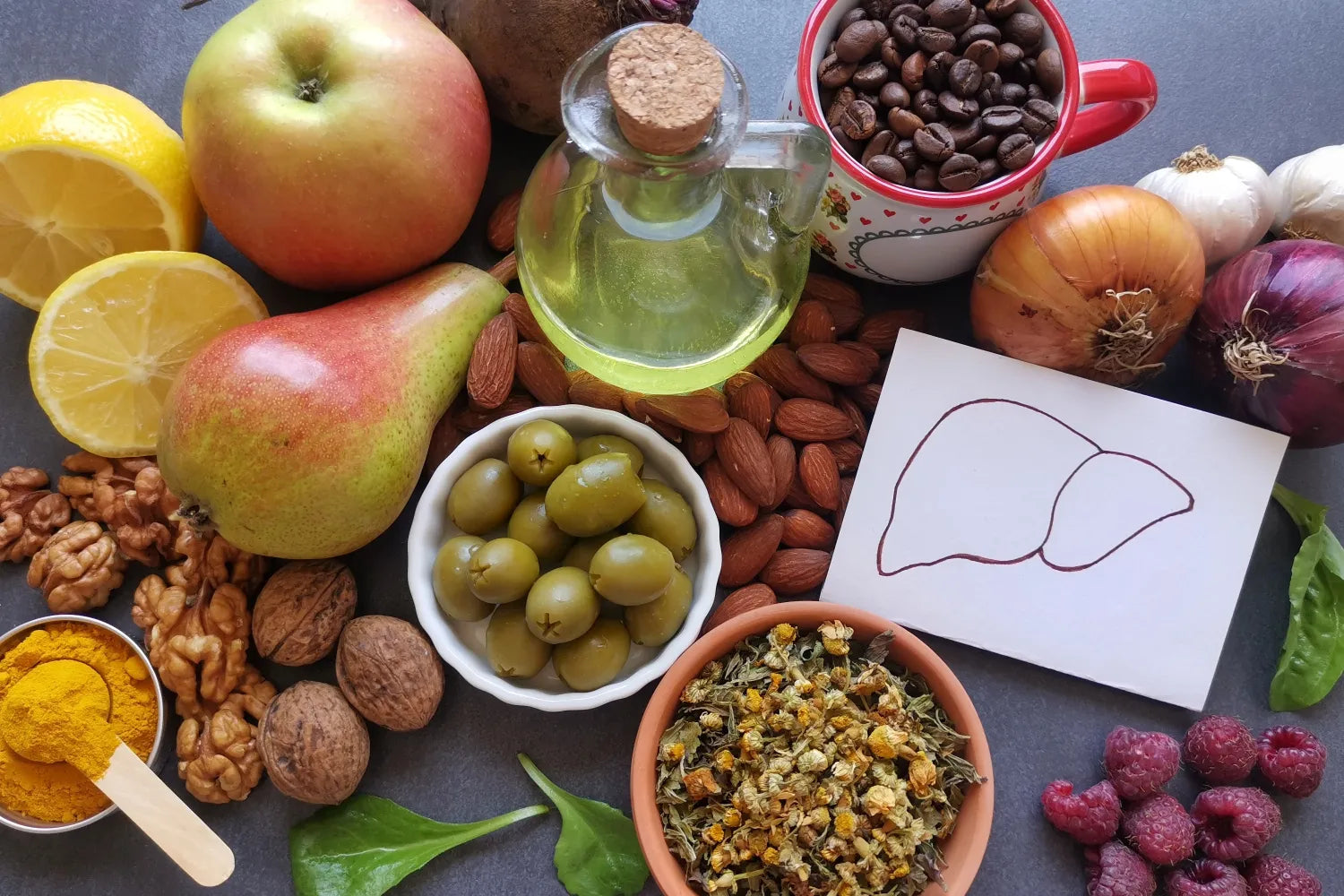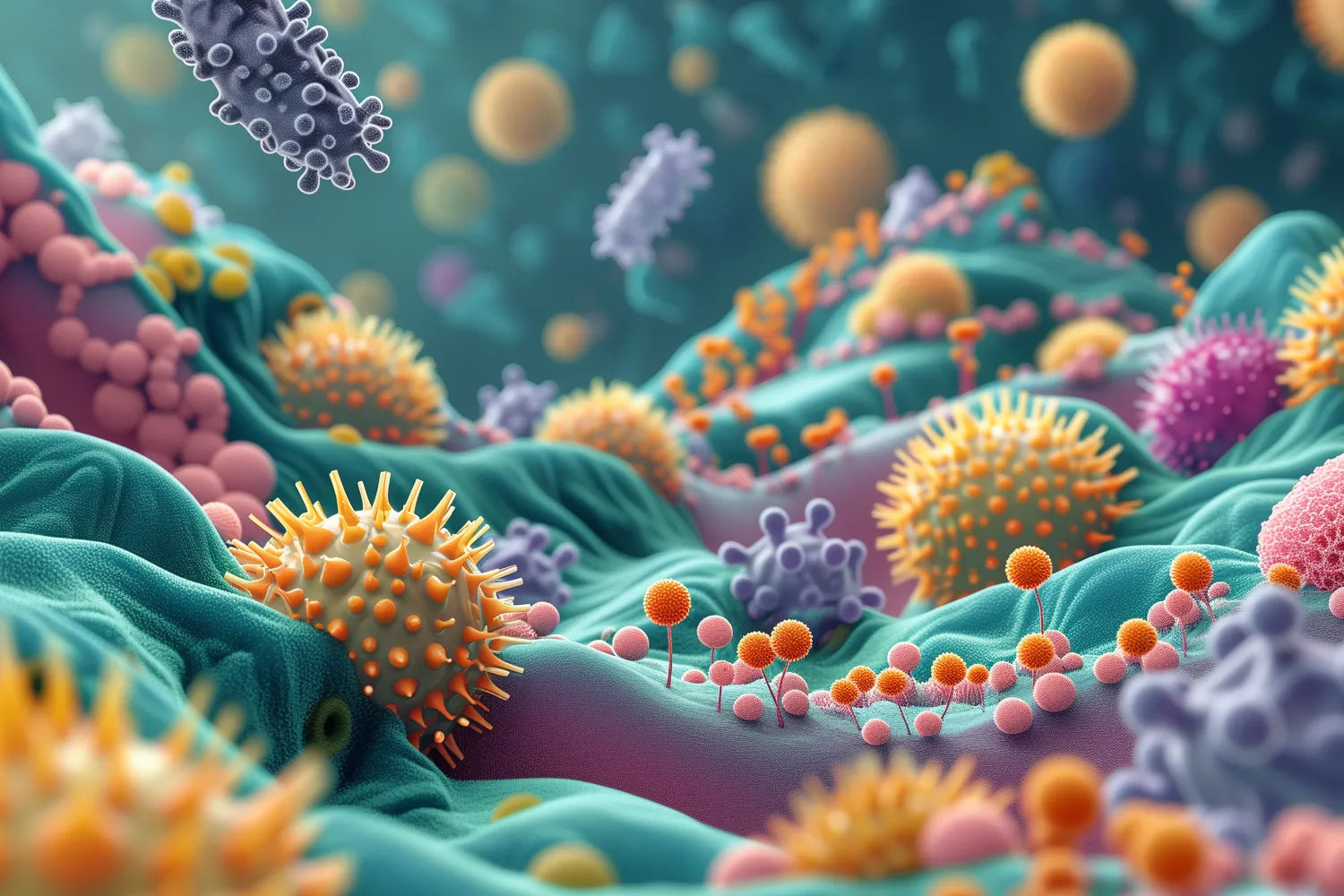
Dr. Eric Venn-Watson’s Highlights
- Loading up on greens, fatty fish, garlic, and nuts can help support your liver’s role as your body’s detox center. In addition, avoiding certain substances (like alcohol and sugar) can help your liver thrive. Taking a liver-supportive supplement like fatty15 is a great way to keep your liver running smoothly.
Your liver does a lot for you. If it had a voice of its own, it might ask you to eat more veggies and cut back on your Old Fashioneds. Unfortunately, the liver doesn’t receive a lot of attention until it starts to become problematic.
This is unfortunate because the liver is a hard-working organ that helps your body eliminate toxins and convert glycogen to glucose for energy. To keep it functioning smoothly, look no further than what’s on your plate.
Together, we’ll talk about the ultimate liver-friendly foods that will help your liver become the ultimate top performer. We’ll also talk about how a fatty acid supplement, known as fatty15, has been shown in multiple studies, including clinical trials, to help support your liver function and improve your liver enzymes.
Understanding Liver Function
If you aren’t sold on why you should make every effort to support your liver, let’s look at a quick recap of the liver’s functions and how important they are to your body.
Your liver performs over 500 functions, including:
- Filtering toxins from the body
- Storing excess glucose as glycogen to be used as energy
- Regulating cholesterol and hormones
- Playing a role in the regulation of blood sugar
- Digesting fats (through the production of bile)
Your liver is your body’s multi-tool. It can do a lot for you, which means treating it kindly by consuming liver-loving foods is really important.
10 Foods Your Liver Loves
Your liver needs vitamins and nutrients to thrive, and it gets those from your diet. If you aren’t eating a well-rounded diet, you could be depriving this workhorse organ of important ingredients to run properly.
Here are 10 foods that can help your liver thrive.
1. Cruciferous Vegetables
The B’s and C’s of the vegetable world (broccoli, Brussels sprouts, cauliflower, and cabbage) are important for liver health. They contain a substance called glucosinolates that help support the liver’s natural detox duties. One study found that consuming broccoli regularly reduced the chances of developing non-alcoholic fatty liver disease, or “NAFLD.”
2. Leafy Greens
Popeye had the right idea. Spinach (and other dark, leafy green vegetables) can supercharge your liver function.
These vegetables contain chlorophyll, a chemical compound that helps filter out toxins before they reach the liver. Chlorophyll binds to certain toxins and helps the body excrete them, reducing the work the liver has to do. Think of leafy greens as the Robin to your liver’s Batman.
3. Coffee
If you’re concerned about reducing your sugar and alcohol consumption to improve your liver health, take heart. You still get to keep your coffee! The American Institute for Cancer Research (AICR) recommends drinking coffee to reduce your risk of developing liver cancer.
Coffee contains naturally occurring compounds (like glutathione) that are linked with anti-cancer activity in the body. The AICR states that just one cup per day reduces the risk of liver cancer by 14%.
4. Green Tea
Don’t like coffee? Try green tea instead. Green tea contains antioxidants that help support liver function. The compounds in green tea have both preventive and therapeutic benefits for the liver, such as helping with lipid metabolism.
There is, however, a caveat. Supplements that offer concentrated green tea extract may not be healthy for you. In fact, they could be dangerous to your liver. Instead, brew your green tea at home and drink it hot or iced.
5. Garlic
Garlic contains two important liver-supportive compounds: selenium and allicin. These compounds help support your liver’s detox functionality and have the added benefit of adding flavor to your food without an excess of calories.
Add garlic to your soups, salads, lean meats, and vegetable dishes. Your liver will thank you, and your taste buds will, too.
6. Avocados
Known to be a source of healthy fat, avocados are also great for your liver. Like coffee, avocados contain glutathione, which is linked to anti-cancer activity in the body.
Avocados contain healthy fats and plenty of fiber and potassium, making them beneficial for your heart health, too. Bottom line? Guacamole may cost extra at the cash register, but it’s helping save your liver health.
7. Beets
These root vegetables contain compounds known as betalains. Betalains are plant-based pigments that give beets their rich color and also boast antioxidant properties. The antioxidants help reduce oxidative stress on liver cells, which helps keep your liver strong. Early research suggests that betalains may even help improve bile production.
8. Turmeric
Adding a little turmeric to your latte or smoothie could help improve your liver health. Turmeric contains curcumin, an anti-inflammatory compound that helps protect your liver. For turmeric to be properly absorbed, you’ll need to consume it with a little black pepper. If you haven’t tried a golden milk yet, here’s your invitation.
9. Nuts
Antioxidant-rich nuts are a great snack option or addition to a salad. Nuts are rich in vitamin E, a potent antioxidant that is sometimes used therapeutically for NAFLD patients. Some nuts, like walnuts, contain a compound known as arginine that helps the body eliminate ammonia. Adding a handful to your daily diet is a snack your liver will appreciate.
10. C15:0
Rounding out our list is a compound that improves your liver function and supports your liver health, but is hard to come by in our diets. C15:0 is an odd-chain, saturated fatty acid that is essential for our bodies.
It was discovered by a team of doctors and scientists from the US Navy studying healthy aging and longevity in bottlenose dolphins. They found that C15:0 was the top predictor of the healthiest aging dolphins.
Since their initial discovery was published in Nature’s Scientific Reports in 2020, there have been over 100 peer-reviewed publications supporting the benefits of C15:0 to our health. C15:0 helps support healthy liver function. Additionally, a series of studies shows that increasing C15:0 via diet or supplementation helps stop liver iron deposition and repair liver function.
C15:0 is so important to your body that not having enough can result in a nutritional deficiency syndrome known as Cellular Fragility Syndrome. Cellular Fragility Syndrome causes our cells to become fragile, which can accelerate cellular aging and increase the risk of developing chronic metabolic, heart, and liver conditions. This deficiency is widespread, affecting approximately 1 in 3 people globally. There is now a global imperative to get C15:0 back into our diets.
Understanding the Impact of C15:0
In addition to your liver health, C15:0 supports your long-term metabolic, red blood cell, cognitive, and immune health.
C15:0 works at the cellular level to:
- Regulate the inflammatory response and calm levels of proinflammatory cytokines.
- Strengthen cellular membranes by up to 80%.
- Clear away damaged, senescent cells.
- Activate AMPK to regulate whole body homeostasis, glucose uptake, and immunity.
- Rescue failing mitochondria, increasing ATP by up to 350% and reducing ROS by 45%.
- Activating PPARɑ and PPARẟ receptors. By activating these receptors, C15:0 has been shown in peer-reviewed studies to support metabolic, immune, heart, and liver health in relevant models. These receptors also help to improve mood and deepen sleep.
C15:0 also helps:
- Improve gut microbiome levels
- Lower bad LDL cholesterol
- Improve liver enzymes
- Support metabolic, immune, cognitive, and red blood cell health
- Support long-term health and wellness
Fatty15 is a smart choice for supporting your liver, as well as your overall long-term health and wellness.
How To Add C15:0 to Your Diet
Unfortunately, C15:0 is not easy to get in our diets because it is only found in trace amounts in some fish (in their heads and skin) and in full-fat dairy products like whole milk and full-fat butter, which we do not generally consume.
Because C15:0 isn’t as readily available to us in our normal foods, getting it in supplement form is important. However, harvesting enough fish (or milking enough cows) to get the C15:0 needed for supplements is not ideal to increase our C15:0 levels.
Enter fatty15, the first and only supplement that contains the pure, vegan-friendly, sustainable form of C15:0 known as FA15™. This once-per-day supplement contains all the C15:0 you need to elevate your circulating levels.
Your C15:0 levels should be between 0.2% and 0.4% of your total fatty acids. You can find out your levels by having your healthcare provider draw your blood, or by clicking here to order an at-home, finger-prick test.
Understanding your C15:0 levels can help make sure you are not deficient in this essential nutrient and help you optimize your levels for your long-term health.
Why a Supplement Is Better
Taking a supplement may be a better way to get the C15:0 you need for several reasons.
- First, it’s ready to absorb. The C15:0 in milk is attached to lipids called triglycerides. The body has to break down the triglycerides to get the C15:0 in an absorbable form. This creates more work for the gut and makes the process less efficient. By contrast, fatty15 is already in free fatty acid form and is more bioavailable.
- Second, it doesn’t contain bad saturated fats. The good C15:0 in whole milk is present in trace amounts, but there’s a lot more bad, even-chain saturated fat in whole milk that you’d consume as well. These fats aren’t good for the body and are consistently associated with poor health outcomes. Fatty15 gives you the good fat you want, and nothing else.
- Last, it doesn’t involve cows or excess calories. The sustainable FA15™ in fatty15 involves no cattle (or any other animal) and lets you get the C15:0 you want without the massive caloric intake of consuming whole milk. You get all the benefits, none of the detriment. Fatty15 contains just one calorie per day, making it easy to maintain a healthy weight.
Eat Your Way to a Healthy Liver
It is important to take care of your liver. Exercising and reducing your alcohol and sugar intake are important, but they are only part of the solution. Preventing C15:0 nutritional deficiencies, which can negatively affect your liver health, along with a balanced diet, can help support your liver health.
Adding fatty15 to your daily health stack is an easy way to support your long-term health and wellness. Your liver and your future self will thank you.
Sources:
American Institute for Cancer Research | Liver Cancer
The effect of green tea intake on risk of liver disease: a meta-analysis | PMC
Therapeutic Application of Betalains: A Review | PMC
Vitamin E as a Treatment for Nonalcoholic Fatty Liver Disease: Reality or Myth? | PMC

Eric Venn-Watson M.D.
CEO, Co-Founder
Senior Scientist, Co-Founder
Eric is a physician, U.S. Navy veteran, and Co-founder and COO of Seraphina Therapeutics. Eric served over 25 years as a Navy and Marine Corps physician, working with the special forces community to improve their health and fitness. Seraphina Therapeutics is a health and wellness company dedicated to advancing global health through the discovery of essential fatty acids and micronutrient therapeutics.
You May Also Like...
7 of the Best Foods for Your Brain Health
Your brain is your body’s command center, keeping your thoughts sharp, your moods balanced, and your memories stored safely (most of the time). It also happens to be one of the hungriest organs you have, demanding a steady stream of...
How To Improve Your Gut Microbiome: 6 Tips
Interested in how to improve your gut microbiome? We’ve got six tips to help your gut thrive and improve your overall digestion.


